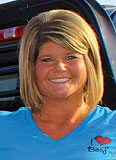 Dick Nugent is a Master Gardener and the manager of the Community Garden at the Houston branch of the University of Missouri Extension Service. He is just one spoke in a wheel that has been turning for a long time. The University of Missouri, founded in 1839, was the first publicly supported institution in the Louisiana Territory. In 1888 the Missouri Agriculture Experiment Station was opened in Columbia, Mo. Later, in 1910, the Missouri Extension Council was established and ready to reach out to all areas of the state. In the past century they have worked, studied, analyzed and recorded successes as well as failures of hundreds of ways to get the most out of Missouri land.
Dick Nugent is a Master Gardener and the manager of the Community Garden at the Houston branch of the University of Missouri Extension Service. He is just one spoke in a wheel that has been turning for a long time. The University of Missouri, founded in 1839, was the first publicly supported institution in the Louisiana Territory. In 1888 the Missouri Agriculture Experiment Station was opened in Columbia, Mo. Later, in 1910, the Missouri Extension Council was established and ready to reach out to all areas of the state. In the past century they have worked, studied, analyzed and recorded successes as well as failures of hundreds of ways to get the most out of Missouri land.
According to Dick, 100 years ago, Texas County produced more than 70 percent of what it consumed. Today, it produces less than 3 percent. He would like to change those statistics,” he said. “The depression did not affect the Ozarks as greatly as elsewhere because the people here knew how to survive and sustain themselves by putting by foods and helping their neighbors.”
Dick has worked to help others become more self-sustainable. The Missouri Extension Service office in Houston, Mo., has six dedicated, degreed, professional nutritional specialists on staff to educate the public on how to not only eat properly, but how to grow, prepare and preserve food. The facility in Houston consists of 1/2 acre and is truly a community project. “The wood chip compost bin is filled by the City of Houston,” Dick said, “they bring us loads of shredded wood as needed instead of dumping it in fill areas, and the Texas County Hospital bags their shredded paper products and gives it to us to use as mulch in our compost.”
The facility at Houston consists of eighty 6 x 8 beds and several 6 x 20 row crop beds and a composting area that demonstrates several types of composting. The entire project is managed by Dick with the enlisted help of Texas County Master Gardeners, 4-H and the Houston Garden Club. The general public has access to the beds and can produce vegetables of their choice in their individual beds. “The produce from the beds managed by the extension service is donated to the local food pantry,” he said. According to Dick, the project has been successful and feeds a lot of people quality, locally grown produce.
Dick, a Master Gardner, would like to see every township in every county work towards becoming self-sustainable. This would include knowledge of natural energy, grains for our consumption as well as for animals, food preparation and preserving skills. “Home-grown groceries are 1,000 miles fresher, dependable, accountable and necessary.”
Dick also says that consumers need to be concerned not only about our community, but our immediate neighbors. He believes by working together and producing as much of our food as possible, we will become a stronger county more dependent upon ourselves, instead an outside food source. He said, “The current financial times provide a good opportunity to learn to take care of ourselves and benefit from home-grown products.”
Dick added, that small livestock such as rabbits, chickens, turkeys and goats are relatively easy to raise and provide food as well as by-products, such as manure for gardens. He sees a future of where we produce what we eat, we use what we have available, and we either repair the soil or learn to grow in the soil we have. “If we follow these guidelines, we, the citizens of this county, will be healthier, because we consume natural, pollution-free food. We will be accountable for our well being as well as thinking about our neighbors and our community,” he concluded.







